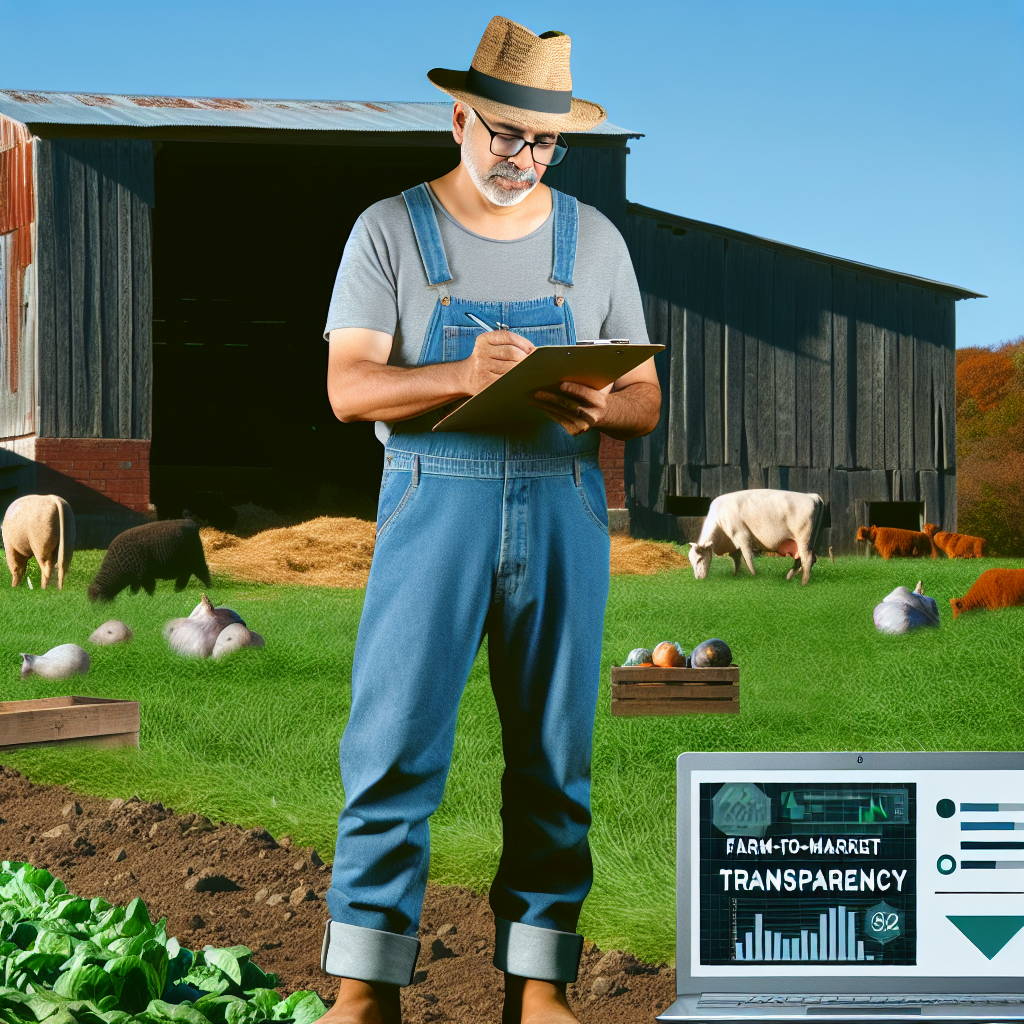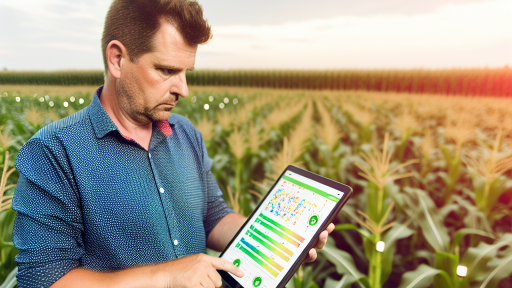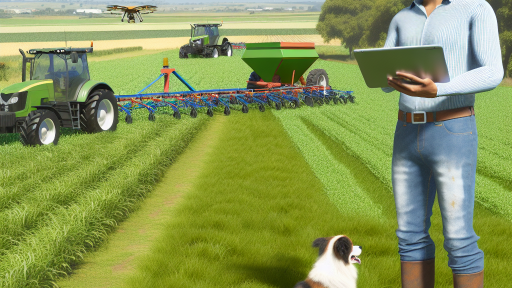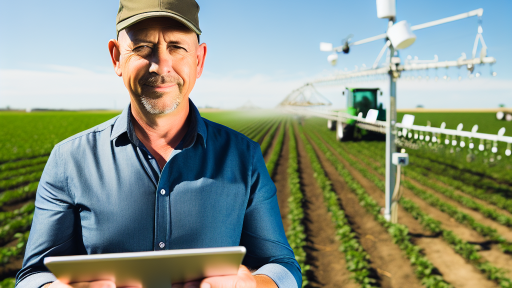Introduction to Blockchain Technology and its Importance in Agriculture
Blockchain technology revolutionizes how we think about data ownership and integrity.
At its core, blockchain provides a distributed ledger system.
This system enhances transparency and security in data transactions.
Moreover, it offers a tamper-proof record of all exchanges.
In agriculture, implementing blockchain can boost consumer trust.
Farmers can showcase the origin of their products easily.
This traceability improves the overall farm-to-market process.
The Role of Blockchain in Enhancing Transparency
Transparency is critical for consumers today.
They demand to know where their food comes from.
With blockchain, each step in the supply chain is recorded.
This includes planting, harvesting, processing, and shipping.
Consequently, it minimizes disputes between suppliers and retailers.
Improving Food Safety and Quality
Blockchain can also improve food safety measures significantly.
In case of a contamination issue, tracking the source becomes easier.
This quick response can prevent widespread foodborne illnesses.
Transform Your Agribusiness
Unlock your farm's potential with expert advice tailored to your needs. Get actionable steps that drive real results.
Get StartedQuality control throughout the supply chain improves as well.
Every product can be traced back to its origins and handling conditions.
Engaging Consumers and Building Trust
Engaging consumers is essential for modern agriculture.
Blockchain allows consumers to verify claims made by producers.
For example, organic or fair-trade certifications can be verified instantly.
Transparency fosters a connection between farmers and consumers.
This relationship can lead to increased loyalty and sales.
Challenges and Considerations
Despite its advantages, blockchain presents challenges in agriculture.
Adoption requires investment in technology and training.
Farmers must learn how to utilize blockchain effectively.
Additionally, interoperability among various systems can pose issues.
Overcoming these hurdles is essential for full-scale implementation.
The Role of Transparency in the Farm-to-Market Supply Chain
Importance of Transparency
Transparency plays a critical role in the farm-to-market supply chain.
It fosters trust among consumers, producers, and retailers.
Additionally, transparency enhances accountability for all parties involved.
As a result, everyone can trace the origins of food products easily.
Consumer Demand for Transparency
Today’s consumers are more informed and health-conscious.
They want to know where their food comes from.
Transparency satisfies this demand by providing clear information.
Moreover, it helps consumers make better purchasing decisions.
The Role of Technology
Technology enhances transparency in the food supply chain.
Blockchain, in particular, offers a secure way to record transactions.
This prevents fraud and ensures data integrity.
Furthermore, it allows real-time tracking of products from farm to table.
Showcase Your Farming Business
Publish your professional farming services profile on our blog for a one-time fee of $200 and reach a dedicated audience of farmers and agribusiness owners.
Publish Your ProfileBuilding Trust Through Transparency
Trust is vital in the relationship between consumers and food producers.
Transparency helps build this trust by revealing production practices.
For instance, consumers can verify the use of organic farming methods.
This verification leads to greater customer loyalty over time.
Challenges and Solutions
Despite its importance, transparency faces challenges in the supply chain.
Data privacy and security remain significant concerns.
Furthermore, not all stakeholders understand how to implement transparent practices.
Education and technological support can address these challenges.
Future of Transparency in Agriculture
The future looks promising for transparency in agriculture.
As technology continues to evolve, so will transparency initiatives.
Blockchain will likely become more integrated into food supply chains.
Ultimately, these advancements will benefit consumers and producers alike.
How Blockchain Enhances Traceability of Agricultural Products
Understanding Blockchain Technology
Blockchain technology operates as a decentralized digital ledger.
This technology allows multiple parties to access and verify data seamlessly.
Moreover, blockchain increases security and reduces the risk of fraud.
Each transaction becomes a permanent record on the chain.
Improving Agricultural Supply Chains
Blockchain enhances transparency in agricultural supply chains.
It allows consumers to track the journey of their food.
Farmers can document every step in the production process.
This includes planting, harvesting, and distribution.
Ensuring Food Safety
Food safety becomes a top priority with blockchain implementation.
Authorities can quickly trace contaminated products back to sources.
This process significantly reduces health risks to consumers.
Furthermore, rapid response times lead to increased public trust.
Real-World Applications
- Companies like IBM and Walmart have initiated blockchain projects.
- These projects focus on tracking food products from farm to table.
- Farmers’ markets are also utilizing blockchain for transparency.
Benefits of Transparent Supply Chains
Transparency leads to improved consumer confidence.
Shoppers increasingly prefer knowing where their food comes from.
Additionally, producers benefit from reduced liability risks.
They can prove the integrity of their products easily.
Future of Blockchain in Agriculture
The future holds promising advancements for blockchain in agriculture.
Innovations may include enhanced tracking apps for consumers.
Furthermore, increased collaboration among stakeholders is expected.
Ultimately, blockchain aims to revolutionize food traceability.
Uncover the Details: Types of Crop Monitoring Sensors You Need
Smart Contracts: Automating Transactions and Reducing Fraud
Understanding Smart Contracts
Smart contracts are self-executing contracts with the terms of the agreement directly written into code.
They operate on blockchain technology, which ensures transparency and security.
Moreover, these contracts automatically enforce and execute agreements without the need for intermediaries.
Benefits of Smart Contracts in Agriculture
Smart contracts streamline agricultural transactions effectively.
This automation minimizes the risk of human error and simplifies record-keeping.
Furthermore, they provide real-time data access, which enhances decision-making.
Reducing Fraud and Misconduct
One of the significant advantages of smart contracts is the reduction of fraud.
Showcase Your Farming Business
Publish your professional farming services profile on our blog for a one-time fee of $200 and reach a dedicated audience of farmers and agribusiness owners.
Publish Your ProfileSince transactions are recorded on an immutable blockchain, tampering becomes virtually impossible.
Additionally, all stakeholders can access the transaction history, increasing accountability.
How Smart Contracts Facilitate Trust
Smart contracts foster trust between farmers and buyers.
The predefined conditions ensure all parties adhere to the agreement.
As a result, disputes become less frequent, leading to smoother transactions.
Real-World Applications
Several companies have started implementing smart contracts in their operations.
For instance, AgriTech Innovations utilizes smart contracts to enhance the supply chain.
This approach significantly improves efficiency and transparency in their transactions.
- Farmers can confirm orders automatically.
- Buyers can verify the quality and provenance of products.
- Payments are made seamlessly upon fulfillment of contract terms.
The Future of Smart Contracts in Farming
The future looks promising for smart contracts in agriculture.
As technology advances, more farmers will adopt these tools.
Ultimately, this will lead to a more transparent and reliable farm-to-market system.
See Related Content: The Role of Drones in Precision Agriculture
Decentralization and Its Impact on Farmers’ Empowerment
Understanding Decentralization
Decentralization shifts power from central authorities to individuals or local entities.
This model enhances transparency and accountability in various industries, including agriculture.
Moreover, it allows farmers to take control of their production and distribution processes.
Blockchain as a Tool for Farmers
Blockchain technology supports decentralization by maintaining a secure, immutable ledger.
Farmers can access real-time data regarding their produce and market conditions.
This information enables them to make informed decisions quickly.
Enhanced Price Visibility
Decentralization opens up access to pricing information across different markets.
As a result, farmers can negotiate better prices for their goods.
Consequently, this practice empowers them to boost their income.
Building Trust with Consumers
Blockchain enhances transparency in the farm-to-market process.
Consumers can verify the origin and quality of their food products.
Therefore, it fosters a sense of trust between farmers and consumers.
Challenges and Opportunities
Despite the potential benefits, farmers face challenges in adopting blockchain.
Many lack the technical knowledge required to utilize this technology effectively.
However, numerous organizations offer training and resources to assist farmers.
Case Studies in Success
Several farmers’ cooperatives have successfully implemented blockchain solutions.
For instance, GreenHarvest Cooperative has increased sales by 30% using blockchain.
Such success stories illustrate the empowerment decentralization can provide.
Explore Further: How Precision Agriculture Enhances Farm Efficiency

Case Studies: Successful Implementations of Blockchain in Agriculture
FarmConnect and Transparency
FarmConnect, a cooperative of organic farmers, adopted blockchain technology.
This decision aimed to enhance supply chain transparency.
Customers now access verified data on product origins easily.
Every step from farm to market is recorded on the blockchain.
This system has increased consumer trust significantly.
Evergreen Tech and Quality Assurance
Evergreen Tech focuses on high-quality produce delivery.
They implemented blockchain to verify quality at every stage.
As a result, they reduced waste and improved freshness.
Consumers can scan QR codes on packaging for product details.
Showcase Your Farming Business
Publish your professional farming services profile on our blog for a one-time fee of $200 and reach a dedicated audience of farmers and agribusiness owners.
Publish Your ProfileThis transparency elevates their market position.
AgriChain’s Efficient Processes
AgriChain has streamlined operations with blockchain technology.
The platform monitors transactions across the supply chain.
Efficiency improvements resulted in reduced costs for farmers.
Farmers receive timely payments, enhancing cash flow.
Moreover, it has strengthened relationships within the supply chain.
HarvestTrace and Food Safety
HarvestTrace addresses food safety concerns through blockchain.
Their system tracks food products from harvest to supermarket.
In case of contamination, they quickly identify affected batches.
This ability minimizes health risks for consumers effectively.
Consequently, retailers benefit from enhanced brand reputation.
Success Stories in Global Markets
Countries like Australia and the Netherlands lead in blockchain adoption.
They have implemented national systems to track agricultural products.
These systems improve compliance, boosting international trade confidence.
Farmers receive real-time updates on market trends and prices.
Therefore, they can make informed decisions to maximize profits.
Discover More: The Role of Robotics in Revolutionizing Modern Farming Practices
Challenges and Limitations of Adopting Blockchain in Farming
Infrastructure Requirements
Implementing blockchain requires robust technological infrastructure.
Many farmers operate without the necessary internet access.
Furthermore, rural areas often lack sufficient digital resources.
This disparity hampers the widespread adoption of the technology.
High Initial Costs
The cost of integrating blockchain can be prohibitive for small farms.
Many producers struggle with existing financial constraints.
This situation creates reluctance towards adopting new technologies.
Investments in blockchain require a clear expectation of long-term benefits.
Complexity and Understanding
Blockchain technology can be complex and difficult to understand.
Farmers may lack the technical expertise needed for implementation.
Moreover, this complexity can discourage potential users.
Educational resources must be developed to overcome this barrier.
Regulatory Challenges
Governments and regulatory bodies must adapt to blockchain technologies.
Existing regulations may not align with blockchain’s decentralized nature.
This misalignment creates uncertainty for farmers considering use.
Clear guidelines will be necessary for promoting transparency and security.
Data Privacy Concerns
Adopting blockchain raises questions about data privacy and ownership.
Farmers must ensure that sensitive information remains secure.
This concern may deter some producers from embracing the technology.
Companies need to establish robust systems for data management.
Future Trends: The Evolution of Blockchain in Farm-to-Market Systems
Growing Adoption of Smart Contracts
Smart contracts automate transactions in farm-to-market chains.
They reduce the need for intermediaries fundamentally.
This streamlines operations and cuts costs for farmers.
Showcase Your Farming Business
Publish your professional farming services profile on our blog for a one-time fee of $200 and reach a dedicated audience of farmers and agribusiness owners.
Publish Your ProfileFarmers can rely on programmed conditions to execute agreements.
Moreover, smart contracts enhance trust between parties.
Improved Traceability with IoT Integration
Integrating blockchain with IoT devices enhances traceability.
Farmers can track products from field to shelf efficiently.
IoT sensors provide real-time data during transportation.
This approach minimizes food fraud significantly.
Consumers gain confidence in product origins and safety.
Increased Transparency and Consumer Engagement
Blockchain promotes transparency throughout the supply chain.
Consumers now demand knowledge of product sources.
Direct access to production data fosters informed choices.
Brands are leveraging blockchain to showcase their efforts.
Transparency often leads to greater customer loyalty.
Decentralization of Supply Chains
Decentralized networks are changing conventional supply chains.
Farmers have more control over their products and profits.
This minimizes risks associated with monopolistic practices.
Moreover, it encourages collaboration among local producers.
Communities benefit from a more distributed economic model.
Regulatory Changes and Innovations
As blockchain technology evolves, regulations will adapt.
Governments are beginning to recognize its potential impact.
Future regulations may focus on enhancing security protocols.
Businesses must stay informed and compliant with these changes.
Innovative practices will emerge from these regulatory shifts.
Additional Resources
Integrating explainable artificial intelligence and blockchain to smart …
Blockchain Technology for Agriculture: Applications and … – Frontiers




